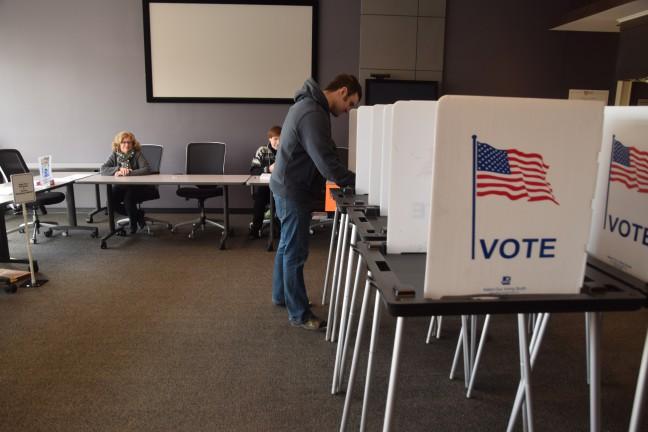Despite having one of the strictest voter ID laws in the country, some Wisconsinites believe the state still faces problems with illegal voting, while others believe the law prevents legal voting.
According to a Marquette University Law School poll released Sept. 21, 18 percent of Wisconsin residents surveyed believe more illegal votes will be cast than legal votes prevented in the Nov. 8 presidential election. In contrast, 37 percent think more legal votes will be prevented than illegal votes cast.
Though the percentage of people in both cases is relatively low, the statistic could highlight underlying clashes between people on whether the voter ID law is actually beneficial to Wisconsin, University of Wisconsin political science professor Barry Burden said.
Illegal voting or voter fraud includes voting multiple times, voter impersonation and voting for ineligible voters. Wisconsin’s voter ID law specifically addresses voter impersonation with its photo ID requirement. The law was much stricter until July 19, when District Judge Lynn Adelman allowed individuals to use signed affidavits instead of photo IDs to vote.
But Burden said it is extremely uncommon for people to vote illegally. He said it is likely people overestimate the prevalence of voter fraud because incidents involving it tend to be sensationalized.
“I think it’s an extremely small number but just the attention these stories get makes it tempting to overestimate how common [voter fraud incidents] are,” Burden said.
According to the Marquette poll, there are disagreements on illegal and legal voting across party lines. Among Republicans, 27 percent think more illegal votes will be cast while 7 percent of Democrats do. Among Democrats, 55 percent think more legal votes will be prevented compared to 24 percent of Republicans.
Sam Kuzniewski, legislative aide for Rep. Scott Allen, R-Waukesha, said without the voter ID law people could easily vote illegally. For instance, if someone knew the name and address of a dead person they could simply go and vote on their behalf. With the photo ID requirement, people cannot do that.
But Rep. Chris Taylor, D-Madison, said Wisconsin has not had a single incident of voter impersonation in its history of elections. She said the law actually excludes certain groups of people like women, people of color and students from voting because these groups are more likely to have no ID or incorrect IDs.
“The voter ID law is designed to target and suppress certain demographics of voters and suppress them so they can’t exercise their constitutional right and vote legally,” Taylor said.
Kuzniewski, however, said just because there has not been a reported incident of voter impersonation does not mean that people are not doing it. People do not always get caught, which is why Wisconsin needs a stricter voter ID law.
The Government Accountability Office in Washington, D.C. conducted a study in 2014 that examined the impact adopting a strict voter ID law would have on voter turnout. According to the report, voter turnout fell by 2 to 3 percent with such a law in place. Burden said it is unclear if this indicates voter suppression but it does show a negative correlation between a strict voter ID law and prevention of legal votes.
Kuzniewski said the election system and voter ID law are set up in a way that gives everyone “abundant opportunities” to acquire voter IDs. If people are being turned away even with IDs it is because the system is working to ensure that only legitimate votes are cast, he said. Those who are trying to vote illegally with IDs will be stopped and those who are legal voters, but do not have the right ID will be reminded to get the correct ID.
“[Illegal voting] really hurts the legitimacy of our democracy and we want to ensure that if a person did choose to vote illegally it would be very difficult for them,” Kuzniewski said.
Disagreements between Republicans and Democrats on voter ID are fairly recent, Burden said. Before the 2000 presidential election, both parties believed that voter ID was not required at the polls. Republicans began advocating for voter ID laws after some voters in Florida were incorrectly labeled felons and could not vote in the 2000 election, Burden said.
Burden said the differences between the two parties could be because Republicans tend to focus on illegal voting incidents while Democrats focus on incidents where legal votes are prevented.
Each party tends to “cling” to these incidents and ignore evidence that refutes their point of view, he said. Conversation between the two would help them sort out their differences and address issues of illegal and legal voting much more efficiently.


